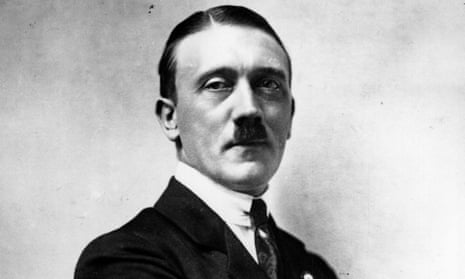Adolf Hitler only joined the Nazis after being rejected by another political party, a leading historian has learned.
Thomas Weber, a professor of history at the University of Aberdeen, unearthed a previously unpublished document that reveals that in 1919 the newly formed German Socialist party shunned Hitler, telling him that it did not want him in the party or writing for its paper.
Weber said that history would have taken a different path if his membership had been accepted. Although also far-right, the German Socialist party was at the time bigger and more successful than the Nazi party. Hitler might have settled for a more minor role and would therefore “have been unlikely to ever come to power”, Weber added.
“Until a year earlier, [he] had not shown any leadership qualities and had been happy to follow orders, rather than to give orders.”
Hitler turned eventually to the Nazi party, becoming its leader in 1921. The German Socialist party was dissolved the following year. “This is a story that has never been covered before,” Weber said. “It finally explains his obsessive behaviour, for the next few years, towards the German Socialist party.
All the other senior members of the early Nazi party favoured merging with the German Socialist party as a junior party in the early 1920s.
Weber said: “Had it not been for Hitler’s steadfast refusal of doing so – at one point, he even resigned from the party for that reason – the Nazi party would have been absorbed by the German Socialist party and thus would have disappeared and history would have taken a different path ... With Hitler’s rejection by the party, Hitler’s behaviour at the time – which no one could really previously explain persuasively – finally makes sense.”
The document is from the testimony of Hans Georg Grassinger, the founding chairman of the German Socialist party. Weber found it in the archive of the Institute of Contemporary History in Munich. “It’s just been overlooked. The problem is that they have so much stuff,” he said.
The document records: “In the autumn of 1919, around September, Hitler appeared in the office of the publishing house to see Grassinger and offered [to] write for the paper, and to join and work for the German Socialist party. He didn’t have any money at the time and he also asked to borrow money from Grassinger. But they [told] him that they had no use for him in the paper and that they also did not want to have him in the party.”
Weber’s research will feature in his forthcoming book, Becoming Hitler: The Making of a Nazi, to be published by Oxford University Press next month .
He said: “There has been a tendency to see in Hitler’s behaviour, between his joining the Nazi party and the mid-1920s, the erratic doings of a prima donna, who acted totally irrationally and who – besides being a gifted orator – did not have many talents as a political operator ... In my book, I show that this gets the story totally wrong. Hitler was, in fact, a skilful and conniving political operator who ... would never forgive anyone who had ever cold-shouldered him and turned him down – and kept a lifelong vengeance towards them.”
He added that, on all three occasions at which mergers of the two parties were proposed, “Hitler put up an absolute stink”: “The story of Hitler being turned down by one party and then his actions in the new party that did accept him – the Nazi party – are thus intimately linked.” The Nuremberg wing of the party, with their “hardcore crazies”, ultimately joined the Nazi party, he said.
Weber’s previous books include Hitler’s First War, which is being adapted into a television mini-series. It included unpublished letters and a diary written by veterans of Hitler’s regiment that challenged long-held views on Hitler’s supposedly brave war record.
